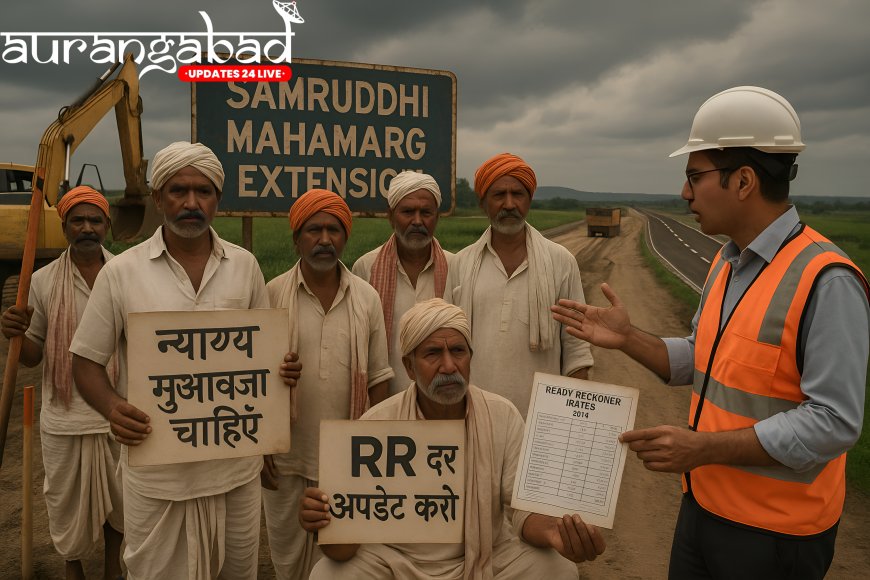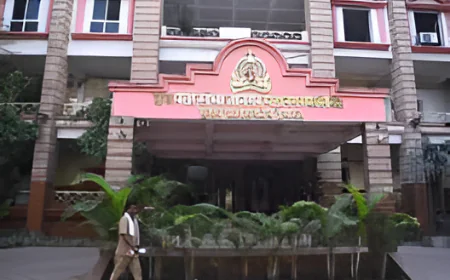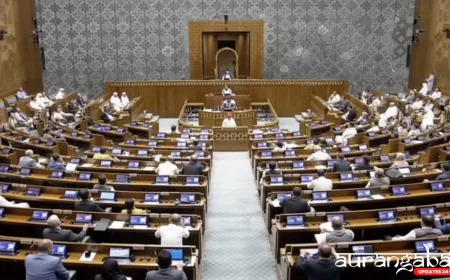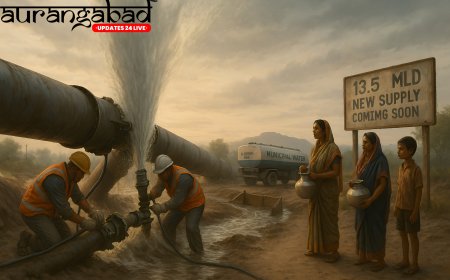Samruddhi Expressway Extension: Farmers Upset Over Land Compensation
Farmers in Maharashtra are expressing strong dissatisfaction with the land compensation offered for the Samruddhi Expressway extension project. They are protesting against inadequate compensation, outdated Ready Reckoner rates, and discrepancies compared to previous acquisitions.

CHHATRAPATI SAMBHAJINAGAR: The ambitious extension of the Nagpur-Mumbai Samruddhi Mahamarg, a flagship infrastructure project for Maharashtra, is facing significant headwinds as farmers in the affected regions express deep dissatisfaction with the proposed land compensation. Landowners along the new stretch, which extends from Sindkhed Raja in Buldhana district to Shegaon in Akola district and further towards Madhya Pradesh, are protesting, claiming the compensation offered is woefully inadequate and disproportionate to current market values.
This brewing conflict highlights the persistent challenges in large-scale infrastructure development, where the imperative of progress often clashes with the fundamental rights and economic security of land-owning communities. The Maharashtra State Road Development Corporation (MSRDC), the implementing agency, now finds itself at a crucial juncture, navigating widespread farmer discontent that threatens to delay a vital connectivity project.
The Project's Vision and Farmer Grievances
The Samruddhi Mahamarg, already operational in its primary phase, is touted as a game-changer for Maharashtra, promising to drastically cut travel time between its two major cities and unlock economic potential across various districts. Its extension is envisioned to further enhance regional connectivity, linking more agricultural and industrial belts to the state's economic arteries and facilitating smoother trade and commerce. This strategic expansion is crucial for integrating less developed areas into the broader economic framework.
However, the path to this expanded vision is currently fraught with farmer grievances. The primary contention revolves around the compensation package being offered for the acquired land. Farmers allege that the rates are far below the prevailing market prices, failing to acknowledge the true value of their agricultural land and the potential for future development.
A core part of their complaint centers on the Ready Reckoner (RR) rates used for valuation. Farmers claim that MSRDC is referencing outdated RR rates, possibly from as far back as 2017. Ready Reckoner rates are the minimum values at which a property can be registered, and they are typically updated annually to reflect market trends. Using older rates, especially when land values have appreciated significantly over the past few years, naturally leads to a substantial disparity between the offered compensation and the actual market worth. For instance, reports suggest compensation offers in some Buldhana areas are around ₹16 lakh per hectare (approximately ₹6.5 lakh per acre), a figure farmers deem entirely insufficient.
Furthermore, a significant point of contention is the discrepancy in compensation compared to what was reportedly paid during the acquisition for the main Nagpur-Mumbai Samruddhi Mahamarg. Farmers argue that if the government paid higher, more equitable rates for the initial phase, the same principle of fair compensation should apply to the extension. This perceived inconsistency fuels a sense of injustice among the affected landowners.
Affected Regions and Escalating Protests
The extension project primarily impacts agricultural communities in Buldhana and Akola districts, with potentially other areas in its broader network, such as parts of Jalna district. Villages along the proposed alignment are witnessing mounting protests, as farmers unite to voice their demands for equitable treatment.
Farmer organizations and local leaders are playing a crucial role in mobilizing these communities. They are actively engaging with the local administration and MSRDC officials, presenting their grievances, and demanding a transparent and fair re-evaluation of land prices. Public meetings are being held, and demonstrations are becoming more frequent, signaling the farmers' resolve to resist acquisition if their demands are not met. The threat of non-cooperation from landowners poses a serious risk of delays for the project's timeline.
For many of these farmers, the land is not merely an asset but the sole source of their livelihood and a deeply ingrained part of their family's heritage. Being dispossessed of their land without adequate compensation means facing economic precarity and the daunting challenge of finding alternative means of income. This underscores why the issue is not just about financial figures but about social justice and the future well-being of entire communities.
Navigating the Administrative Stance and Seeking Resolution
Implementing agencies like MSRDC typically operate under tight deadlines and budget constraints for such large-scale projects. Delays in land acquisition can lead to significant cost overruns and defer the realization of the project's economic benefits. However, neglecting genuine farmer grievances can also result in prolonged legal battles, social unrest, and reputational damage for the government.
Currently, there hasn't been a public, comprehensive response from the administration addressing the farmers' specific demands for revised compensation rates. Historically, in similar situations, governments often engage in dialogue with farmer representatives to negotiate and potentially revise compensation packages. They may also explore additional rehabilitation and resettlement benefits to mitigate the impact of displacement.
Potential solutions could involve:
-
A reassessment of compensation rates based on current market values, possibly incorporating a robust social impact assessment.
-
Offering improved rehabilitation and resettlement packages that go beyond monetary compensation to include skill development, alternative land, or other livelihood support.
-
Engaging in more transparent and continuous dialogue with affected farmers, ensuring their voices are heard throughout the process.
-
Exploring special provisions for farmers whose entire landholdings are acquired, ensuring they are not left without means of support.












































